Leadership and Management: Value-Based Leadership in the Military
VerifiedAdded on 2020/02/24
|8
|1920
|57
Report
AI Summary
This report delves into the concept of value-based leadership, emphasizing its significance in contemporary organizations, particularly within the military context. It contrasts value-based leadership with rule or authority-based approaches, highlighting the former's focus on leader characteristics and behavior rather than power. The report examines the application of value-based leadership in the US military, using Lieutenant General Jane Wolfenbarger as a case study, showcasing how her integrity and values contributed to her success in reorganizing the AFMC. It explores how value-based leadership fosters integrity, ethical decision-making, and strong interpersonal relationships, enhancing organizational effectiveness and enabling leaders to navigate complex challenges. The report also discusses how value-based leadership in the military supports the development of leaders, promotes a positive working environment, and facilitates the achievement of organizational objectives. Finally, it examines the impact of value-based leadership on the career development of leaders and the overall growth of organizations.
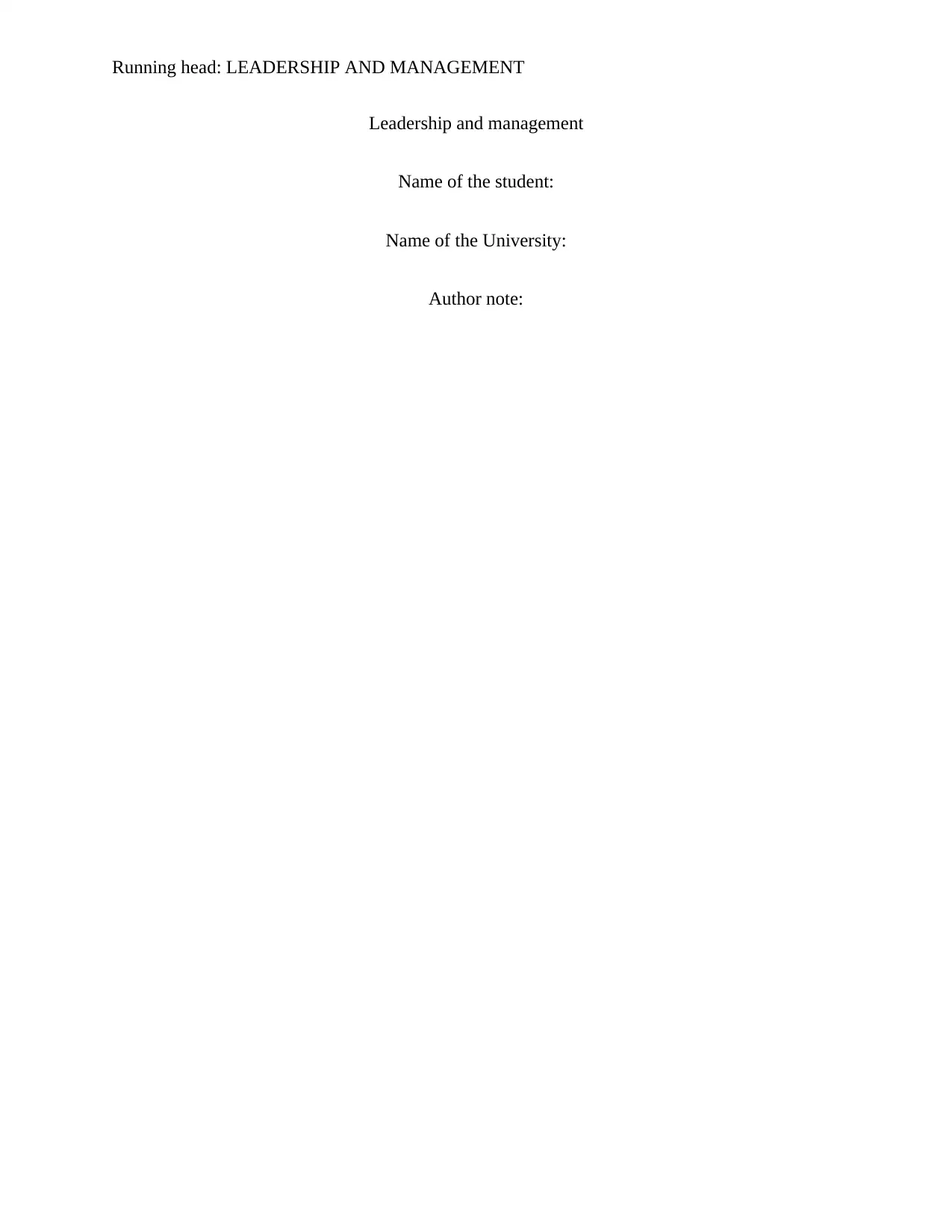
Running head: LEADERSHIP AND MANAGEMENT
Leadership and management
Name of the student:
Name of the University:
Author note:
Leadership and management
Name of the student:
Name of the University:
Author note:
Paraphrase This Document
Need a fresh take? Get an instant paraphrase of this document with our AI Paraphraser
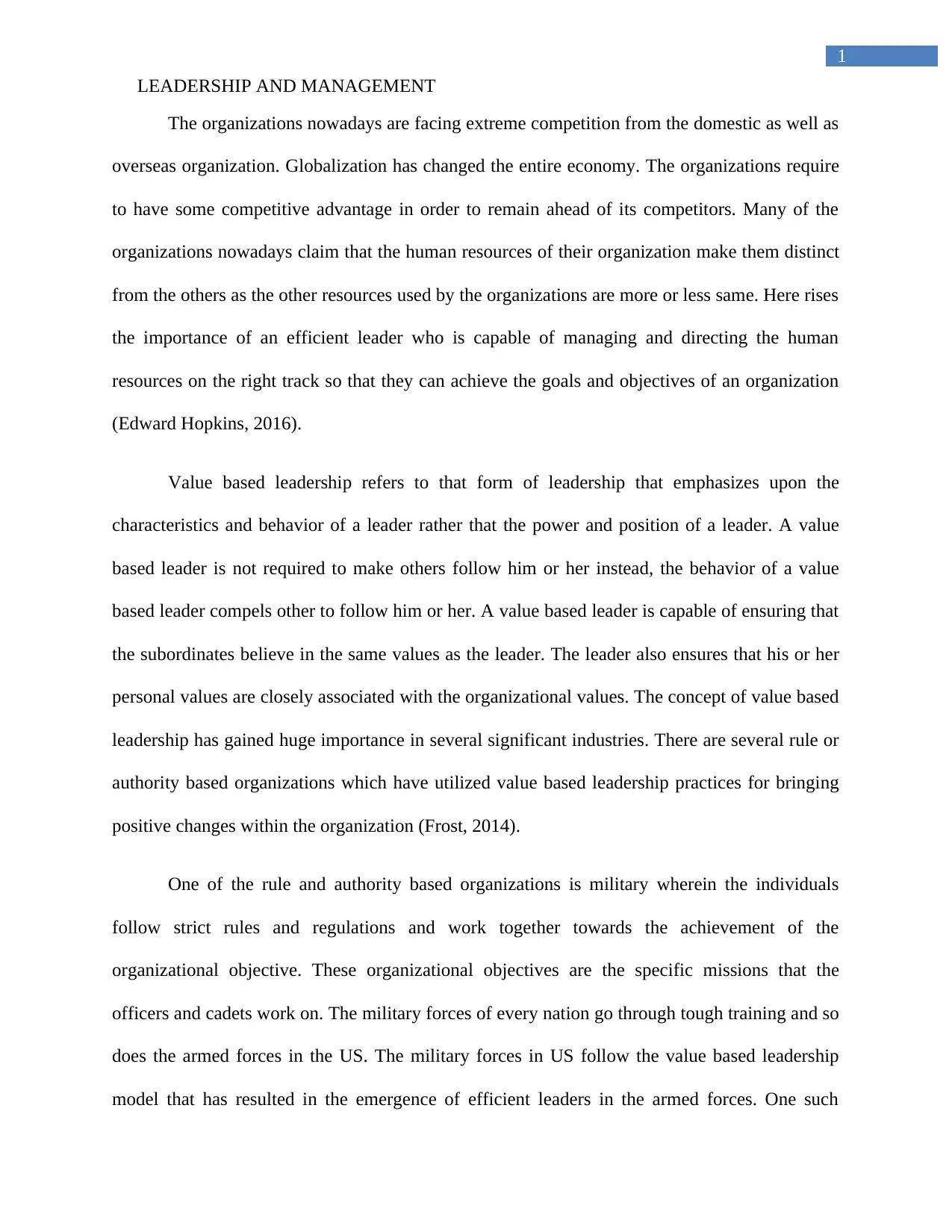
1
LEADERSHIP AND MANAGEMENT
The organizations nowadays are facing extreme competition from the domestic as well as
overseas organization. Globalization has changed the entire economy. The organizations require
to have some competitive advantage in order to remain ahead of its competitors. Many of the
organizations nowadays claim that the human resources of their organization make them distinct
from the others as the other resources used by the organizations are more or less same. Here rises
the importance of an efficient leader who is capable of managing and directing the human
resources on the right track so that they can achieve the goals and objectives of an organization
(Edward Hopkins, 2016).
Value based leadership refers to that form of leadership that emphasizes upon the
characteristics and behavior of a leader rather that the power and position of a leader. A value
based leader is not required to make others follow him or her instead, the behavior of a value
based leader compels other to follow him or her. A value based leader is capable of ensuring that
the subordinates believe in the same values as the leader. The leader also ensures that his or her
personal values are closely associated with the organizational values. The concept of value based
leadership has gained huge importance in several significant industries. There are several rule or
authority based organizations which have utilized value based leadership practices for bringing
positive changes within the organization (Frost, 2014).
One of the rule and authority based organizations is military wherein the individuals
follow strict rules and regulations and work together towards the achievement of the
organizational objective. These organizational objectives are the specific missions that the
officers and cadets work on. The military forces of every nation go through tough training and so
does the armed forces in the US. The military forces in US follow the value based leadership
model that has resulted in the emergence of efficient leaders in the armed forces. One such
LEADERSHIP AND MANAGEMENT
The organizations nowadays are facing extreme competition from the domestic as well as
overseas organization. Globalization has changed the entire economy. The organizations require
to have some competitive advantage in order to remain ahead of its competitors. Many of the
organizations nowadays claim that the human resources of their organization make them distinct
from the others as the other resources used by the organizations are more or less same. Here rises
the importance of an efficient leader who is capable of managing and directing the human
resources on the right track so that they can achieve the goals and objectives of an organization
(Edward Hopkins, 2016).
Value based leadership refers to that form of leadership that emphasizes upon the
characteristics and behavior of a leader rather that the power and position of a leader. A value
based leader is not required to make others follow him or her instead, the behavior of a value
based leader compels other to follow him or her. A value based leader is capable of ensuring that
the subordinates believe in the same values as the leader. The leader also ensures that his or her
personal values are closely associated with the organizational values. The concept of value based
leadership has gained huge importance in several significant industries. There are several rule or
authority based organizations which have utilized value based leadership practices for bringing
positive changes within the organization (Frost, 2014).
One of the rule and authority based organizations is military wherein the individuals
follow strict rules and regulations and work together towards the achievement of the
organizational objective. These organizational objectives are the specific missions that the
officers and cadets work on. The military forces of every nation go through tough training and so
does the armed forces in the US. The military forces in US follow the value based leadership
model that has resulted in the emergence of efficient leaders in the armed forces. One such
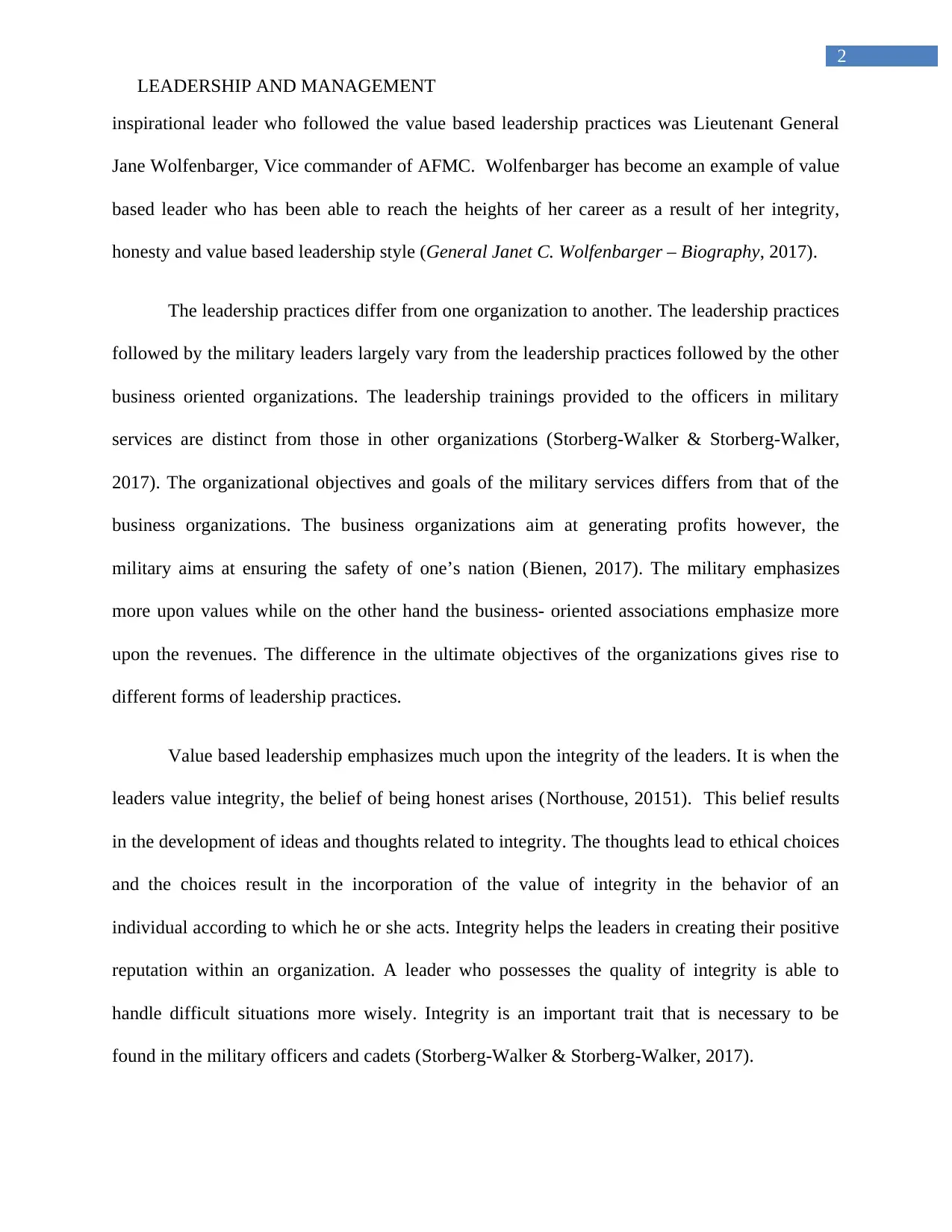
2
LEADERSHIP AND MANAGEMENT
inspirational leader who followed the value based leadership practices was Lieutenant General
Jane Wolfenbarger, Vice commander of AFMC. Wolfenbarger has become an example of value
based leader who has been able to reach the heights of her career as a result of her integrity,
honesty and value based leadership style (General Janet C. Wolfenbarger – Biography, 2017).
The leadership practices differ from one organization to another. The leadership practices
followed by the military leaders largely vary from the leadership practices followed by the other
business oriented organizations. The leadership trainings provided to the officers in military
services are distinct from those in other organizations (Storberg-Walker & Storberg-Walker,
2017). The organizational objectives and goals of the military services differs from that of the
business organizations. The business organizations aim at generating profits however, the
military aims at ensuring the safety of one’s nation (Bienen, 2017). The military emphasizes
more upon values while on the other hand the business- oriented associations emphasize more
upon the revenues. The difference in the ultimate objectives of the organizations gives rise to
different forms of leadership practices.
Value based leadership emphasizes much upon the integrity of the leaders. It is when the
leaders value integrity, the belief of being honest arises (Northouse, 20151). This belief results
in the development of ideas and thoughts related to integrity. The thoughts lead to ethical choices
and the choices result in the incorporation of the value of integrity in the behavior of an
individual according to which he or she acts. Integrity helps the leaders in creating their positive
reputation within an organization. A leader who possesses the quality of integrity is able to
handle difficult situations more wisely. Integrity is an important trait that is necessary to be
found in the military officers and cadets (Storberg-Walker & Storberg-Walker, 2017).
LEADERSHIP AND MANAGEMENT
inspirational leader who followed the value based leadership practices was Lieutenant General
Jane Wolfenbarger, Vice commander of AFMC. Wolfenbarger has become an example of value
based leader who has been able to reach the heights of her career as a result of her integrity,
honesty and value based leadership style (General Janet C. Wolfenbarger – Biography, 2017).
The leadership practices differ from one organization to another. The leadership practices
followed by the military leaders largely vary from the leadership practices followed by the other
business oriented organizations. The leadership trainings provided to the officers in military
services are distinct from those in other organizations (Storberg-Walker & Storberg-Walker,
2017). The organizational objectives and goals of the military services differs from that of the
business organizations. The business organizations aim at generating profits however, the
military aims at ensuring the safety of one’s nation (Bienen, 2017). The military emphasizes
more upon values while on the other hand the business- oriented associations emphasize more
upon the revenues. The difference in the ultimate objectives of the organizations gives rise to
different forms of leadership practices.
Value based leadership emphasizes much upon the integrity of the leaders. It is when the
leaders value integrity, the belief of being honest arises (Northouse, 20151). This belief results
in the development of ideas and thoughts related to integrity. The thoughts lead to ethical choices
and the choices result in the incorporation of the value of integrity in the behavior of an
individual according to which he or she acts. Integrity helps the leaders in creating their positive
reputation within an organization. A leader who possesses the quality of integrity is able to
handle difficult situations more wisely. Integrity is an important trait that is necessary to be
found in the military officers and cadets (Storberg-Walker & Storberg-Walker, 2017).
⊘ This is a preview!⊘
Do you want full access?
Subscribe today to unlock all pages.

Trusted by 1+ million students worldwide
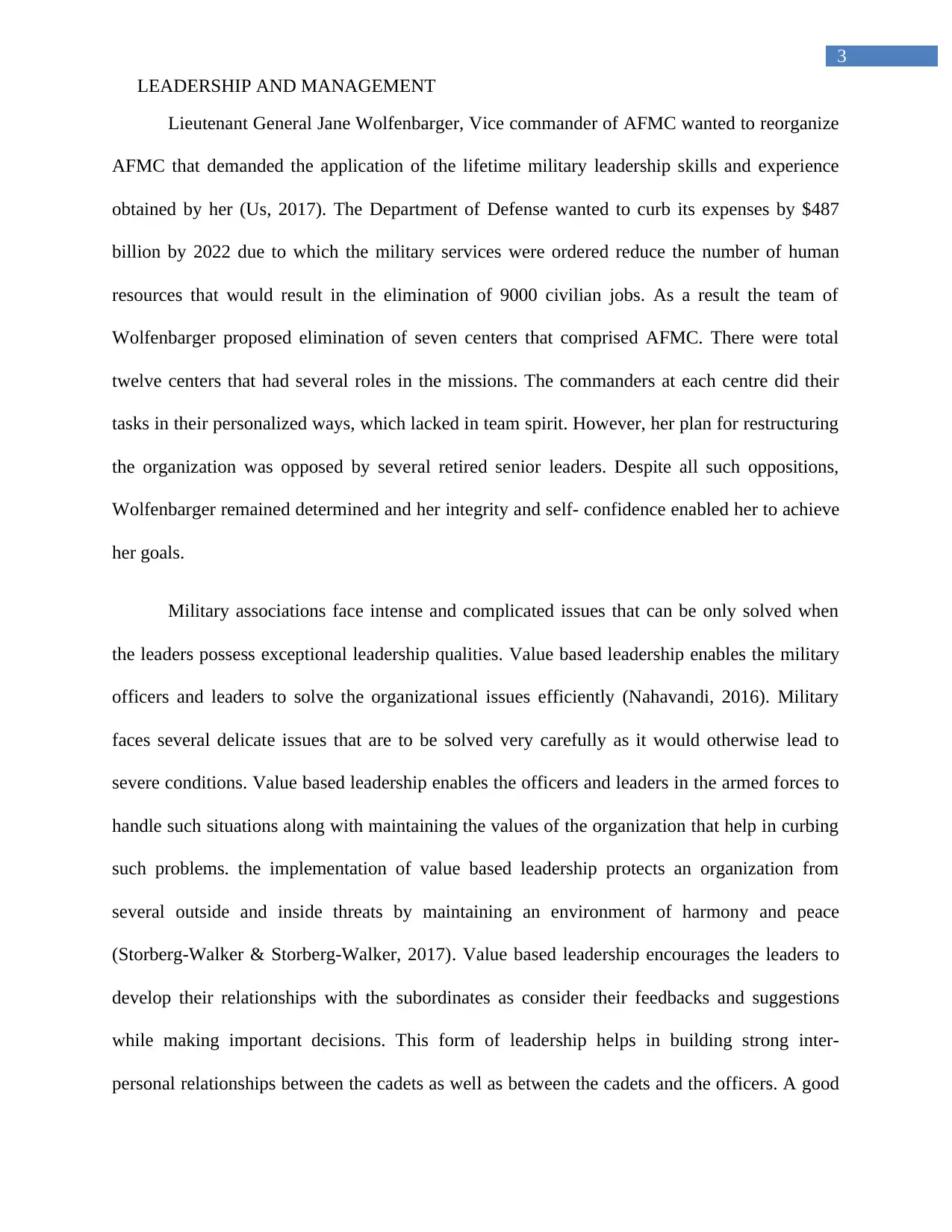
3
LEADERSHIP AND MANAGEMENT
Lieutenant General Jane Wolfenbarger, Vice commander of AFMC wanted to reorganize
AFMC that demanded the application of the lifetime military leadership skills and experience
obtained by her (Us, 2017). The Department of Defense wanted to curb its expenses by $487
billion by 2022 due to which the military services were ordered reduce the number of human
resources that would result in the elimination of 9000 civilian jobs. As a result the team of
Wolfenbarger proposed elimination of seven centers that comprised AFMC. There were total
twelve centers that had several roles in the missions. The commanders at each centre did their
tasks in their personalized ways, which lacked in team spirit. However, her plan for restructuring
the organization was opposed by several retired senior leaders. Despite all such oppositions,
Wolfenbarger remained determined and her integrity and self- confidence enabled her to achieve
her goals.
Military associations face intense and complicated issues that can be only solved when
the leaders possess exceptional leadership qualities. Value based leadership enables the military
officers and leaders to solve the organizational issues efficiently (Nahavandi, 2016). Military
faces several delicate issues that are to be solved very carefully as it would otherwise lead to
severe conditions. Value based leadership enables the officers and leaders in the armed forces to
handle such situations along with maintaining the values of the organization that help in curbing
such problems. the implementation of value based leadership protects an organization from
several outside and inside threats by maintaining an environment of harmony and peace
(Storberg-Walker & Storberg-Walker, 2017). Value based leadership encourages the leaders to
develop their relationships with the subordinates as consider their feedbacks and suggestions
while making important decisions. This form of leadership helps in building strong inter-
personal relationships between the cadets as well as between the cadets and the officers. A good
LEADERSHIP AND MANAGEMENT
Lieutenant General Jane Wolfenbarger, Vice commander of AFMC wanted to reorganize
AFMC that demanded the application of the lifetime military leadership skills and experience
obtained by her (Us, 2017). The Department of Defense wanted to curb its expenses by $487
billion by 2022 due to which the military services were ordered reduce the number of human
resources that would result in the elimination of 9000 civilian jobs. As a result the team of
Wolfenbarger proposed elimination of seven centers that comprised AFMC. There were total
twelve centers that had several roles in the missions. The commanders at each centre did their
tasks in their personalized ways, which lacked in team spirit. However, her plan for restructuring
the organization was opposed by several retired senior leaders. Despite all such oppositions,
Wolfenbarger remained determined and her integrity and self- confidence enabled her to achieve
her goals.
Military associations face intense and complicated issues that can be only solved when
the leaders possess exceptional leadership qualities. Value based leadership enables the military
officers and leaders to solve the organizational issues efficiently (Nahavandi, 2016). Military
faces several delicate issues that are to be solved very carefully as it would otherwise lead to
severe conditions. Value based leadership enables the officers and leaders in the armed forces to
handle such situations along with maintaining the values of the organization that help in curbing
such problems. the implementation of value based leadership protects an organization from
several outside and inside threats by maintaining an environment of harmony and peace
(Storberg-Walker & Storberg-Walker, 2017). Value based leadership encourages the leaders to
develop their relationships with the subordinates as consider their feedbacks and suggestions
while making important decisions. This form of leadership helps in building strong inter-
personal relationships between the cadets as well as between the cadets and the officers. A good
Paraphrase This Document
Need a fresh take? Get an instant paraphrase of this document with our AI Paraphraser
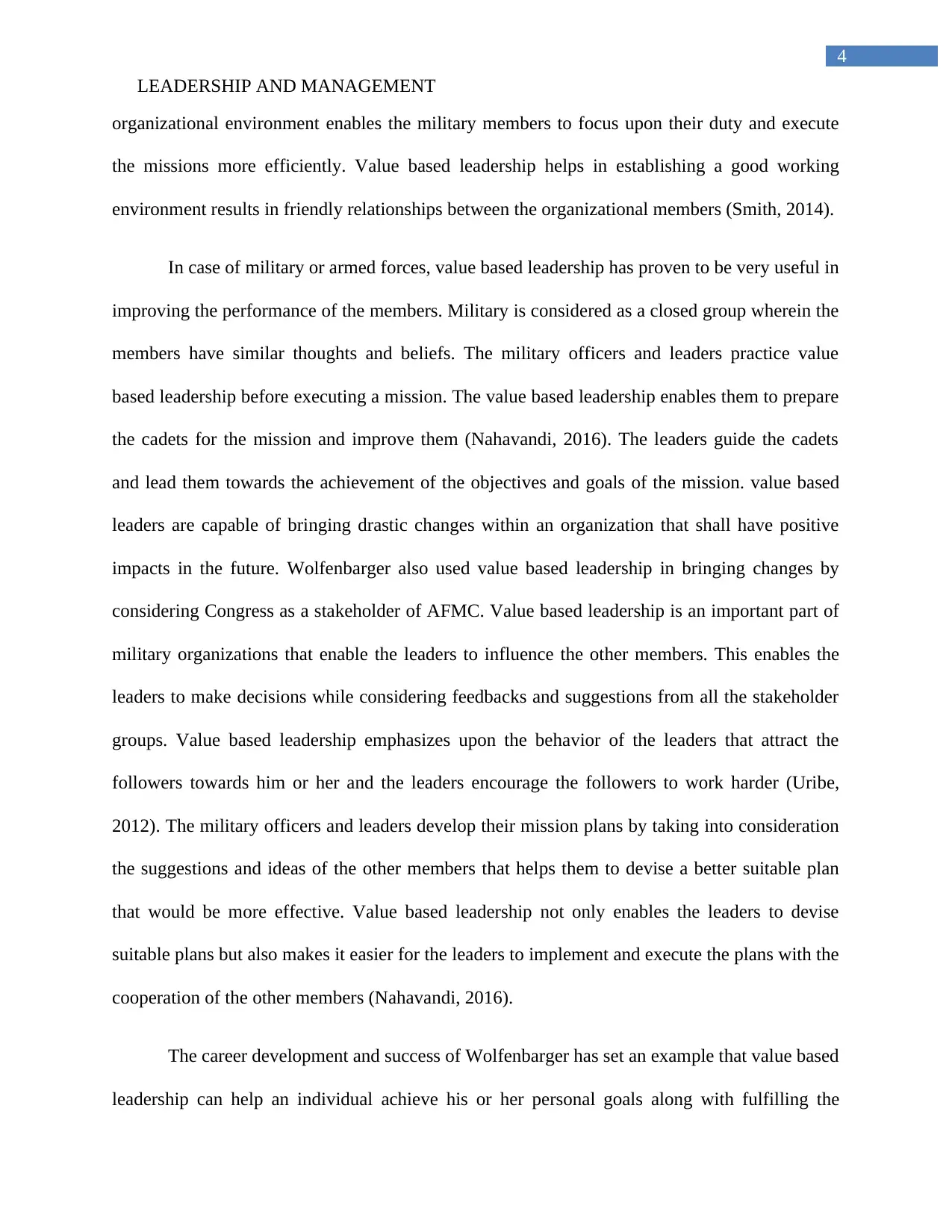
4
LEADERSHIP AND MANAGEMENT
organizational environment enables the military members to focus upon their duty and execute
the missions more efficiently. Value based leadership helps in establishing a good working
environment results in friendly relationships between the organizational members (Smith, 2014).
In case of military or armed forces, value based leadership has proven to be very useful in
improving the performance of the members. Military is considered as a closed group wherein the
members have similar thoughts and beliefs. The military officers and leaders practice value
based leadership before executing a mission. The value based leadership enables them to prepare
the cadets for the mission and improve them (Nahavandi, 2016). The leaders guide the cadets
and lead them towards the achievement of the objectives and goals of the mission. value based
leaders are capable of bringing drastic changes within an organization that shall have positive
impacts in the future. Wolfenbarger also used value based leadership in bringing changes by
considering Congress as a stakeholder of AFMC. Value based leadership is an important part of
military organizations that enable the leaders to influence the other members. This enables the
leaders to make decisions while considering feedbacks and suggestions from all the stakeholder
groups. Value based leadership emphasizes upon the behavior of the leaders that attract the
followers towards him or her and the leaders encourage the followers to work harder (Uribe,
2012). The military officers and leaders develop their mission plans by taking into consideration
the suggestions and ideas of the other members that helps them to devise a better suitable plan
that would be more effective. Value based leadership not only enables the leaders to devise
suitable plans but also makes it easier for the leaders to implement and execute the plans with the
cooperation of the other members (Nahavandi, 2016).
The career development and success of Wolfenbarger has set an example that value based
leadership can help an individual achieve his or her personal goals along with fulfilling the
LEADERSHIP AND MANAGEMENT
organizational environment enables the military members to focus upon their duty and execute
the missions more efficiently. Value based leadership helps in establishing a good working
environment results in friendly relationships between the organizational members (Smith, 2014).
In case of military or armed forces, value based leadership has proven to be very useful in
improving the performance of the members. Military is considered as a closed group wherein the
members have similar thoughts and beliefs. The military officers and leaders practice value
based leadership before executing a mission. The value based leadership enables them to prepare
the cadets for the mission and improve them (Nahavandi, 2016). The leaders guide the cadets
and lead them towards the achievement of the objectives and goals of the mission. value based
leaders are capable of bringing drastic changes within an organization that shall have positive
impacts in the future. Wolfenbarger also used value based leadership in bringing changes by
considering Congress as a stakeholder of AFMC. Value based leadership is an important part of
military organizations that enable the leaders to influence the other members. This enables the
leaders to make decisions while considering feedbacks and suggestions from all the stakeholder
groups. Value based leadership emphasizes upon the behavior of the leaders that attract the
followers towards him or her and the leaders encourage the followers to work harder (Uribe,
2012). The military officers and leaders develop their mission plans by taking into consideration
the suggestions and ideas of the other members that helps them to devise a better suitable plan
that would be more effective. Value based leadership not only enables the leaders to devise
suitable plans but also makes it easier for the leaders to implement and execute the plans with the
cooperation of the other members (Nahavandi, 2016).
The career development and success of Wolfenbarger has set an example that value based
leadership can help an individual achieve his or her personal goals along with fulfilling the
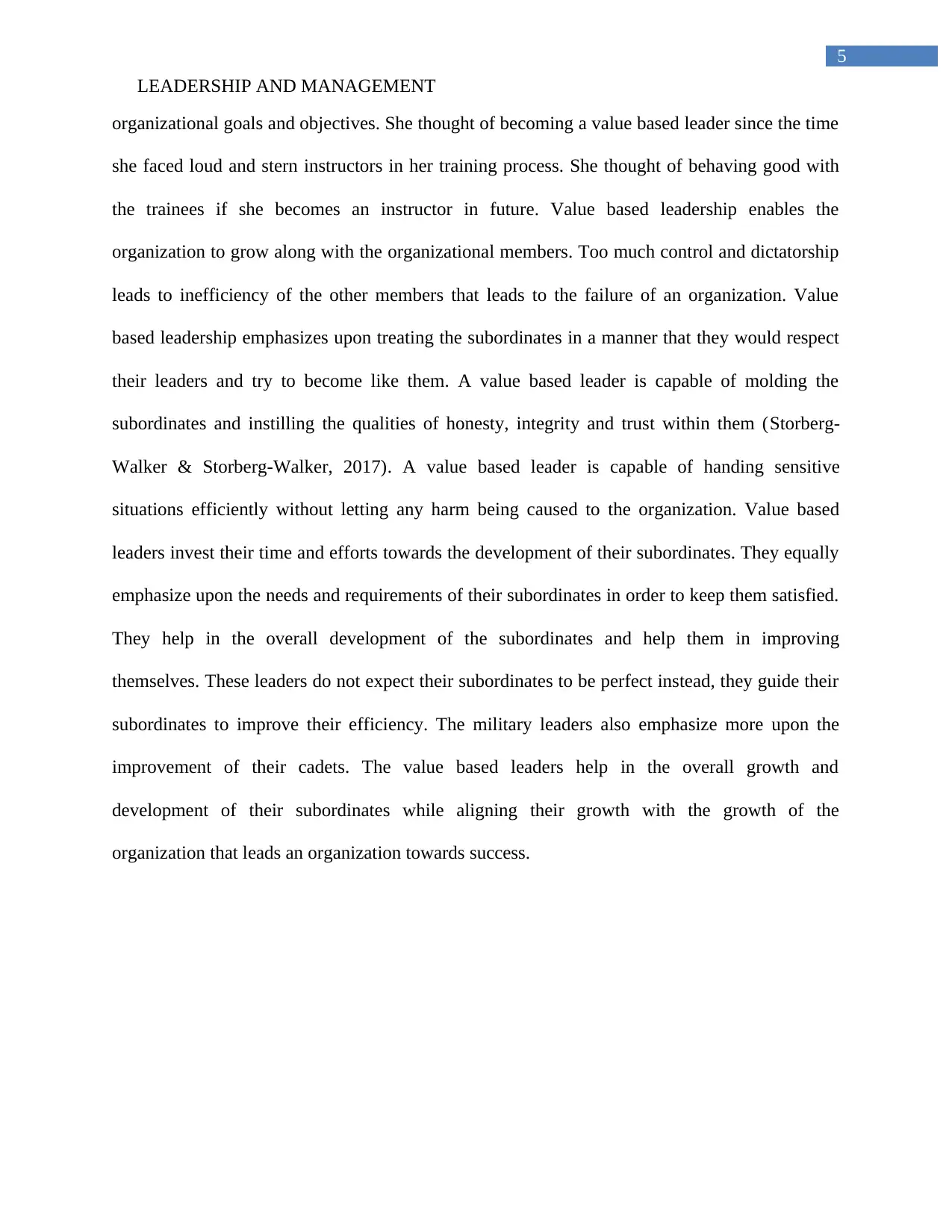
5
LEADERSHIP AND MANAGEMENT
organizational goals and objectives. She thought of becoming a value based leader since the time
she faced loud and stern instructors in her training process. She thought of behaving good with
the trainees if she becomes an instructor in future. Value based leadership enables the
organization to grow along with the organizational members. Too much control and dictatorship
leads to inefficiency of the other members that leads to the failure of an organization. Value
based leadership emphasizes upon treating the subordinates in a manner that they would respect
their leaders and try to become like them. A value based leader is capable of molding the
subordinates and instilling the qualities of honesty, integrity and trust within them (Storberg-
Walker & Storberg-Walker, 2017). A value based leader is capable of handing sensitive
situations efficiently without letting any harm being caused to the organization. Value based
leaders invest their time and efforts towards the development of their subordinates. They equally
emphasize upon the needs and requirements of their subordinates in order to keep them satisfied.
They help in the overall development of the subordinates and help them in improving
themselves. These leaders do not expect their subordinates to be perfect instead, they guide their
subordinates to improve their efficiency. The military leaders also emphasize more upon the
improvement of their cadets. The value based leaders help in the overall growth and
development of their subordinates while aligning their growth with the growth of the
organization that leads an organization towards success.
LEADERSHIP AND MANAGEMENT
organizational goals and objectives. She thought of becoming a value based leader since the time
she faced loud and stern instructors in her training process. She thought of behaving good with
the trainees if she becomes an instructor in future. Value based leadership enables the
organization to grow along with the organizational members. Too much control and dictatorship
leads to inefficiency of the other members that leads to the failure of an organization. Value
based leadership emphasizes upon treating the subordinates in a manner that they would respect
their leaders and try to become like them. A value based leader is capable of molding the
subordinates and instilling the qualities of honesty, integrity and trust within them (Storberg-
Walker & Storberg-Walker, 2017). A value based leader is capable of handing sensitive
situations efficiently without letting any harm being caused to the organization. Value based
leaders invest their time and efforts towards the development of their subordinates. They equally
emphasize upon the needs and requirements of their subordinates in order to keep them satisfied.
They help in the overall development of the subordinates and help them in improving
themselves. These leaders do not expect their subordinates to be perfect instead, they guide their
subordinates to improve their efficiency. The military leaders also emphasize more upon the
improvement of their cadets. The value based leaders help in the overall growth and
development of their subordinates while aligning their growth with the growth of the
organization that leads an organization towards success.
⊘ This is a preview!⊘
Do you want full access?
Subscribe today to unlock all pages.

Trusted by 1+ million students worldwide
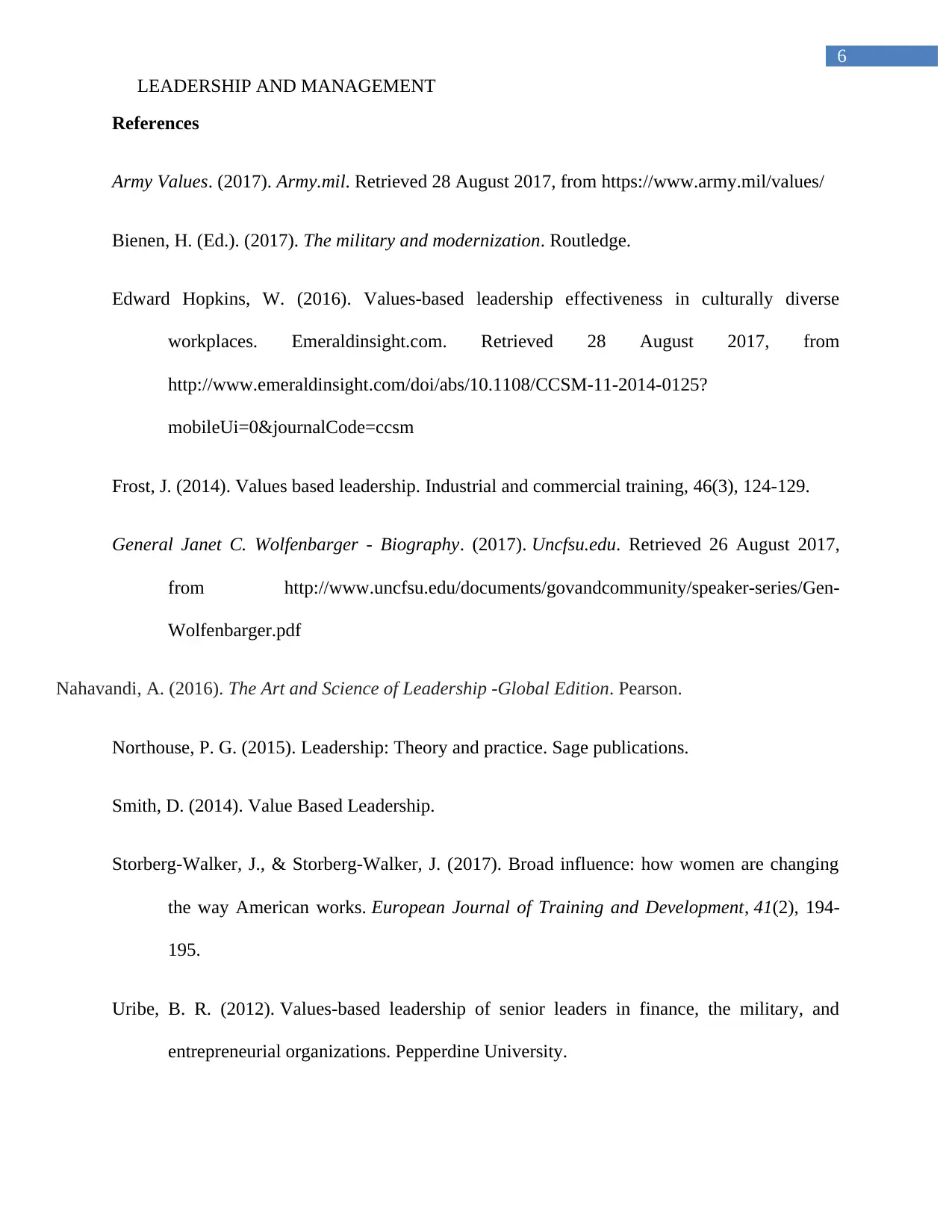
6
LEADERSHIP AND MANAGEMENT
References
Army Values. (2017). Army.mil. Retrieved 28 August 2017, from https://www.army.mil/values/
Bienen, H. (Ed.). (2017). The military and modernization. Routledge.
Edward Hopkins, W. (2016). Values-based leadership effectiveness in culturally diverse
workplaces. Emeraldinsight.com. Retrieved 28 August 2017, from
http://www.emeraldinsight.com/doi/abs/10.1108/CCSM-11-2014-0125?
mobileUi=0&journalCode=ccsm
Frost, J. (2014). Values based leadership. Industrial and commercial training, 46(3), 124-129.
General Janet C. Wolfenbarger - Biography. (2017). Uncfsu.edu. Retrieved 26 August 2017,
from http://www.uncfsu.edu/documents/govandcommunity/speaker-series/Gen-
Wolfenbarger.pdf
Nahavandi, A. (2016). The Art and Science of Leadership -Global Edition. Pearson.
Northouse, P. G. (2015). Leadership: Theory and practice. Sage publications.
Smith, D. (2014). Value Based Leadership.
Storberg-Walker, J., & Storberg-Walker, J. (2017). Broad influence: how women are changing
the way American works. European Journal of Training and Development, 41(2), 194-
195.
Uribe, B. R. (2012). Values-based leadership of senior leaders in finance, the military, and
entrepreneurial organizations. Pepperdine University.
LEADERSHIP AND MANAGEMENT
References
Army Values. (2017). Army.mil. Retrieved 28 August 2017, from https://www.army.mil/values/
Bienen, H. (Ed.). (2017). The military and modernization. Routledge.
Edward Hopkins, W. (2016). Values-based leadership effectiveness in culturally diverse
workplaces. Emeraldinsight.com. Retrieved 28 August 2017, from
http://www.emeraldinsight.com/doi/abs/10.1108/CCSM-11-2014-0125?
mobileUi=0&journalCode=ccsm
Frost, J. (2014). Values based leadership. Industrial and commercial training, 46(3), 124-129.
General Janet C. Wolfenbarger - Biography. (2017). Uncfsu.edu. Retrieved 26 August 2017,
from http://www.uncfsu.edu/documents/govandcommunity/speaker-series/Gen-
Wolfenbarger.pdf
Nahavandi, A. (2016). The Art and Science of Leadership -Global Edition. Pearson.
Northouse, P. G. (2015). Leadership: Theory and practice. Sage publications.
Smith, D. (2014). Value Based Leadership.
Storberg-Walker, J., & Storberg-Walker, J. (2017). Broad influence: how women are changing
the way American works. European Journal of Training and Development, 41(2), 194-
195.
Uribe, B. R. (2012). Values-based leadership of senior leaders in finance, the military, and
entrepreneurial organizations. Pepperdine University.
Paraphrase This Document
Need a fresh take? Get an instant paraphrase of this document with our AI Paraphraser

7
LEADERSHIP AND MANAGEMENT
Us, A. (2017). GENERAL JANET C. WOLFENBARGER > U.S. Air Force > Biography Display.
Af.mil. Retrieved 28 August 2017, from
http://www.af.mil/About-Us/Biographies/Display/Article/107934/general-janet-c-wolfenbarger/
LEADERSHIP AND MANAGEMENT
Us, A. (2017). GENERAL JANET C. WOLFENBARGER > U.S. Air Force > Biography Display.
Af.mil. Retrieved 28 August 2017, from
http://www.af.mil/About-Us/Biographies/Display/Article/107934/general-janet-c-wolfenbarger/
1 out of 8
Related Documents
Your All-in-One AI-Powered Toolkit for Academic Success.
+13062052269
info@desklib.com
Available 24*7 on WhatsApp / Email
![[object Object]](/_next/static/media/star-bottom.7253800d.svg)
Unlock your academic potential
Copyright © 2020–2026 A2Z Services. All Rights Reserved. Developed and managed by ZUCOL.




